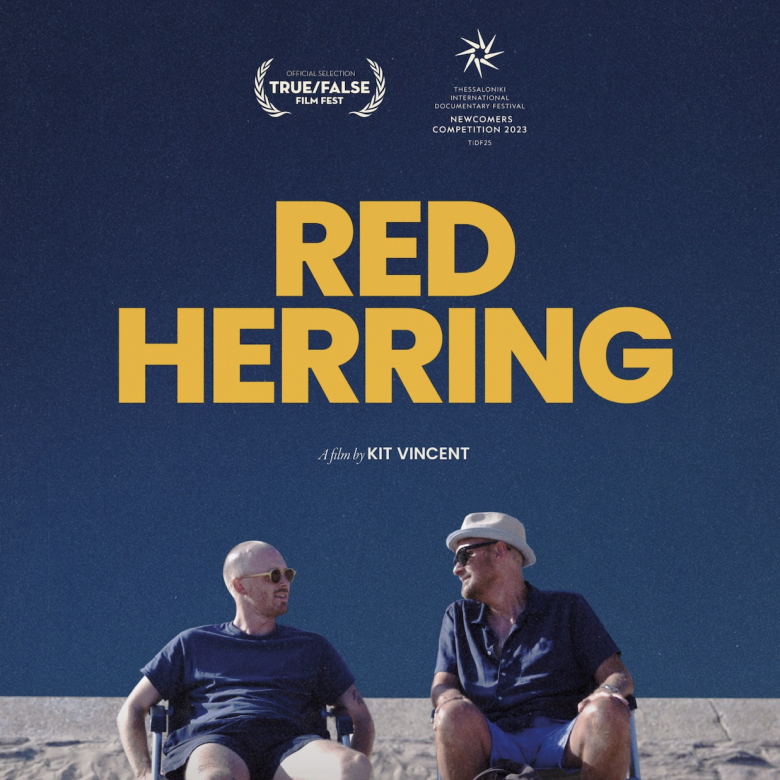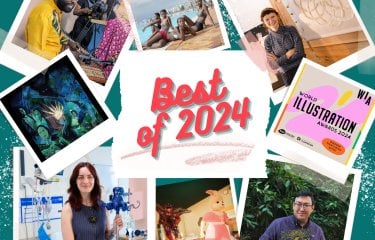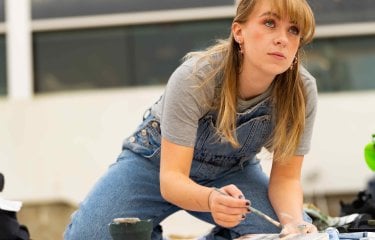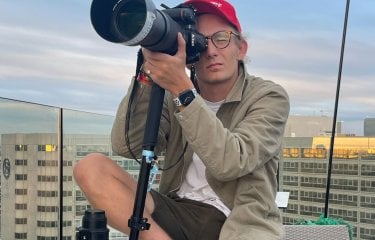Falmouth student wins Best UK Feature at Raindance Film Festival for his work on ‘Red Herring’
27 November 2023

MA Film & Television student David Higgs is no stranger to working on award-winning films. His recent documentary Kamali was awarded Best Short Documentary at Raindance and Camerimage, and was nominated for a BAFTA (2020) in Best British Short category. David’s stock has now risen higher still with his latest documentary Red Herring winning Best UK Feature at Raindance.
Red Herring, directed by Kit Vincent, tells the story of the director’s discovery of a late-stage tumour in his brain and the impact this diagnosis has on his life and the relationships with his loved ones. David edited the film with his wife Hattie Brooks-Ward.
We spoke to David about his career in documentary film editing, his experiences working on Red Herring and how relocating to Cornwall, starting a family and studying at Falmouth is changing his perception on filmmaking.
You’ve got a lot of experience working on documentaries, what is it that you enjoy most about documentary filmmaking?
Moving into documentaries was a significant turning point for me. Prior to that I had mostly worked in commercials and music videos, which I never really enjoyed much. I discovered that editing docs has a lot in common with screenwriting. You have a real influence on the way the story is told, so it’s very inventive. It’s like a giant jigsaw puzzle; you know it’s a picture of a mountain, but you choose how it’s pieced together and from which angle you depict it.
I always wanted to write so I found the process satisfied that interest and made me a better writer. It’s hard but enormously satisfying when it starts falling into place. You’re also dealing with real people and situations, so there’s a strong sense of responsibility to tell the story truthfully. But there’s an infinite number of ways to reach that truth. It sounds a bit corny, but it’s a privilege to be trusted with that.
What attracted you most to Kit Vincent’s story? Tell us about your experiences working on Red Herring.
My wife, Hattie, is also an editor and she was involved with Red Herring from the very beginning. I think the whole project was about five years from start to finish, as docs often are, so she committed years of her time to help it develop. Eventually they received funding from the BFI and it grew from there. I helped shoot for a few days early on and got to know Kit and his dad, who are both very special people. I was sort of always connected by proxy and became very involved emotionally, so naturally I was happy to join officially when the time came.
The hardest part of the process is organising and becoming fluent in the footage. By the time I joined, Hattie knew it all like the back of her hand and had laid most of the groundwork. I had a couple of features under my belt by then, so I really just helped with the structuring and finessing. It was fun working in tandem, passing scenes back and forth and problem solving. It’s always very intense working with such a sensitive and personal subject as this. You become a sort of pseudo-therapist as you try and squeeze out all the emotion, which can be tough. It was an incredible team though and we’re all very proud of it.
What message do you hope viewers will take away from the film?
Kit’s brain tumour made him want to reconcile with his family, and he did that by talking to them. So, I think it’s a story about the healing power of communication. I guess the message is try and have those conversations before it’s too late - and take care of the people you love. And we always hope it makes people laugh and cry.
You’ve worked on award-winning films before, how does it feel to edit another award-winning documentary?
It’s great knowing that a film is being watched and people are responding well to it. Festivals are a nice payoff for the graft. Awards and nominations definitely help raise your profile. It gives you something to shout about on social media and helps to put yourself out there. Especially if, like me, you’re not very good at doing that. One of the first short docs I edited went on to be nominated for a BAFTA, and although we didn’t win, I met the producers of the winning film, who later hired me for a feature - so it’s great when it leads directly to an opportunity.
Festivals and accolades are great, but I don’t think they should be the barometer to measure success by. They are massively competitive, and films aren’t selected for all sorts of reasons, not just because they didn’t like it. Some strike a chord for some reason; others slip through the net. I’ve seen plenty of good films slip through the net. It’s a shame they’re not being seen, given how hard they are to make.
Image right: David Higgs and his wife, and co-producer on Red Herring, Hattie Brooks-Ward

What made you decide to come to Falmouth for your masters? What made you feel like Falmouth would be the best place to progress your career?
I applied on a whim when I found out I was becoming a father. I had been thinking about making my own films for a long time and I wanted to get out of London to explore that. Studying seemed like the best way to give myself the headspace to focus. I love Cornwall and know it well, so it was the only place I considered. I’m excited by the growing independent film scene here. There are so many interesting filmmakers and I’m hoping SoFT [School of Film & Television] will be a gateway to that.
I’m not that interested in going back to London now. I love editing documentaries and will continue when I finish the master's but I want to balance that with making my own films too - which will be fiction rather than documentary. I’ve come here with a very clear idea of what I want to do. I’m looking forward to the next semester when I can start making that happen.
Tell us about your experiences of being a postgraduate student in Falmouth
I love Falmouth, it’s a great town and the students bring so much to it. I’m a musician so I appreciate that there’s so much music. The Tuesday folk night at the Moth and Moon is great. I’m what you might call a ‘mature’ student though. I have a 4-month-old baby and more grey hair than most of my lecturers. I wish I could get a little more involved in things, but it is what it is. I wouldn’t trade my daughter for anything.
____
Speaking about David’s achievement, Nick Manley, MA Film & Television Lecturer said: “David's excellent achievement shows a professionally recognised creative talent that I hope he can develop and expand upon with the opportunities here at Falmouth.
“The MA welcomes students with both professional working experience as well as those with film & TV ambitions but no previous time in the industry. To that end we promote a close-knit collaborative structure that strives for quality outcomes.”




